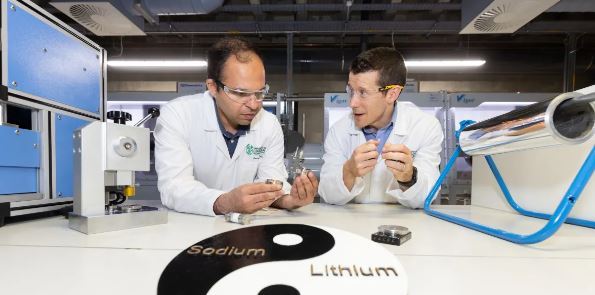Science
University of Limerick Unveils Groundbreaking Dual-Cation Battery

Researchers at the University of Limerick have achieved a significant milestone in energy storage technology by developing the world’s first full-cell dual-cation battery. This innovative system utilizes both lithium and sodium ions, promising to enhance the performance and sustainability of electric vehicles and portable electronics. The findings were published in the journal Nano Energy.
The research, spearheaded by Hugh Geaney, Associate Professor in Chemistry at UL’s Department of Chemical Sciences and Principal Investigator at the Bernal Institute, alongside Government of Ireland postdoctoral fellow, Dr. Syed Abdul Ahad, demonstrates a novel approach to battery technology. The project also involved collaboration with researchers from the University of Birmingham.
Traditional sodium-only batteries have limitations in performance compared to their lithium counterparts. The new dual-cation system combines the strengths of both lithium and sodium, enhancing battery capacity and stability. “For the first time, we’ve shown that sodium-ion batteries can be ‘supercharged’ by pairing sodium and lithium in a sodium-dominant dual-cation electrolyte,” Geaney explained. This advancement could significantly impact sustainable energy solutions.
Dr. Abdul Ahad highlighted the breakthrough, stating, “By introducing both lithium and sodium cations, we actually double the battery’s capacity that would otherwise be lower in a typical sodium-ion battery.” This innovative approach allows lithium to serve as a “capacity booster” within the electrolyte, improving energy density while ensuring long-term stability.
The implications of this development are substantial. The enhanced battery design not only increases the range of electric vehicles but also promotes safety and sustainability by reducing reliance on costly materials such as cobalt. Sodium-ion batteries are viewed as a more sustainable alternative to lithium-ion batteries, and this new technology addresses previous energy density concerns.
With the ability to cycle for up to 1,000 cycles, this dual-cation battery represents a greener and more cost-effective solution for energy storage. The research was funded by the Government of Ireland Postdoctoral Fellowship and the Research Ireland Frontiers for the Future programme.
Looking ahead, the research team plans to further explore new material combinations and ion systems, including silicon-based anodes and alternative pairings such as lithium-magnesium and potassium-lithium. This exploration aligns with the ongoing mission of the Geaney Research Group, which focuses on developing innovative materials for energy storage applications.
With over 30 active researchers in UL’s battery cluster and the multidisciplinary AMPEiRE centre for battery and energy materials research, the University of Limerick continues to lead in the quest for next-generation energy solutions. This groundbreaking work not only sets the stage for future advancements in battery technology but also underscores the potential for more sustainable energy practices globally.
-

 Top Stories1 month ago
Top Stories1 month agoTributes Surge for 9-Year-Old Leon Briody After Cancer Battle
-

 Entertainment3 months ago
Entertainment3 months agoAimee Osbourne Joins Family for Emotional Tribute to Ozzy
-

 Politics3 months ago
Politics3 months agoDanny Healy-Rae Considers Complaint After Altercation with Garda
-

 Top Stories2 months ago
Top Stories2 months agoIreland Enjoys Summer Heat as Hurricane Erin Approaches Atlantic
-

 World3 months ago
World3 months agoHawaii Commemorates 80 Years Since Hiroshima Bombing with Ceremony
-

 Top Stories3 months ago
Top Stories3 months agoFianna Fáil TDs Urgently Consider Maire Geoghegan-Quinn for Presidency
-

 World3 months ago
World3 months agoGaza Aid Distribution Tragedy: 20 Killed Amid Ongoing Violence
-

 World3 months ago
World3 months agoCouple Convicted of Murdering Two-Year-Old Grandson in Wales
-

 Top Stories1 month ago
Top Stories1 month agoNewcastle West Woman Patricia Foley Found Safe After Urgent Search
-

 Top Stories2 months ago
Top Stories2 months agoClimbing Errigal: A Must-Do Summer Adventure in Donegal
-

 Top Stories2 months ago
Top Stories2 months agoHike Donegal’s Errigal Mountain NOW for Unforgettable Summer Views
-

 World3 months ago
World3 months agoAristocrat Constance Marten and Partner Convicted of Infant Murder









